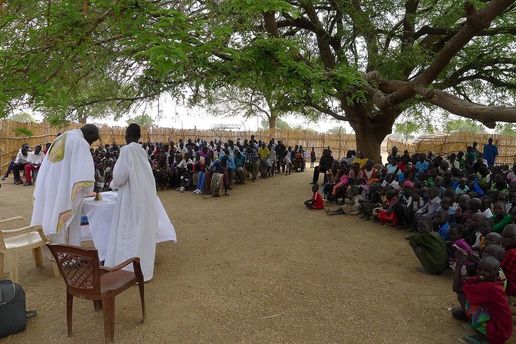 Holy Mass under a tree
Holy Mass under a tree He says, “I say to you, whoever divorces his wife (unless the marriage is unlawful) and marries another commits adultery.” Many good Catholics have asked me with if they can receive communion after getting a divorce. Christ’s words today clearly answer that question. A divorced person may receive communion and all the graces the Holy Eucharist brings. However, if one marries a second person, without having proven the unlawfulness of the first marriage (annulment), he commits adultery. A hard teaching? Yes, but a teaching that leads to life. These are God’s words, not man’s.
I think it providential that in the Gospel for the day the Synod opened in 2015 Jesus made the same point. After hearing this, many at the Synod were reassured that God had given spouses the gift of “indissolubility,” the grace to be faithful to spouse and children until death. But some at the synod, in particular many of the German bishops, argued that marriage is not indissoluble, and so a divorced and remarried Catholic should receive Holy Communion. Other wealthier countries began to side with the German prelates. The bishops of Germany receive billions from a government “church tax” on those who identify as Catholic. If the bishops insist on difficult teachings, much of this revenue stream would dry up as taxpayers leave the Church. The Church in Germany is awash in money but its parishes are largely empty. In contrast to the German hierarchy, the bishops of Africa vigorously defended Christ’s obvious and constant teaching on marriage at the Synod. The Church in Africa is so poor that many parishes hold Mass under a tree because they cannot afford a building. These Masses, however, last three hours and are packed.
Pope Francis has called for a Church of and for the poor. Africa, not Europe, is that Church at the moment. When it comes to the Gospel, the poor have much to teach the wealthy. Let us look to Catholic dioceses that are faithful, robust, and poor in spirit, often poor in body too, for a path to Christian renewal.


 RSS Feed
RSS Feed